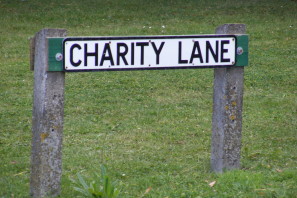“Charity is finding a baby drowning in a
stream and pulling it out; charity is pulling
out a second baby and a third baby that
come floating down the stream. . .
Justice is going upstream, finding out who’s
throwing the babies in, and stopping the evil
at its source.”
Dean Scotty McLennan, Stanford Memorial Church 26.09.04
To find out pupils’ attitudes towards charity and their willingness to take action, a class of Year 11 (age 15 to 16) pupils was given a series of statements. The statements are possible answers to two questions: What is charity? and Why do you give to charity?
They were asked whether they strongly agree, agree, strongly disagree, disagree, or neither agree nor disagree with the possible answers.
Their responses are really interesting, showing a strong sense of pity, and a belief that charity does make a long-term difference. Very few pupils thought that charity was a money-making scam, and most thought its aim was to help.
Results from Group 1 (out of 26 valid responses)
| What is charity? | Strongly Disagree | Disagree | Neither | Agree | Strongly Agree |
| 1. Rich giving to poor | 4 | 4 | 12 | 4 | 1 |
| 2. Handouts | 2 | 4 | 16 | 4 | 0 |
| 3. Helping the less fortunate | 1 | 2 | 0 | 4 | 15 |
| 4. A means of control | 1 | 5 | 10 | 4 | 3 |
| 5. A tool for campaigning | 1 | 5 | 10 | 4 | 3 |
| 6. Helping those who can’t help themselves | 0 | 6 | 2 | 13 | 5 |
| 7. Plugging the gap in government funding | 3 | 7 | 14 | 2 | 0 |
| 8. A money-making scam | 15 | 10 | 2 | 0 | 0 |
| 9. Make a long-term difference | 0 | 4 | 7 | 10 | 5 |
| Why do you give to charity? | Strongly Disagree | Disagree | Neither | Agree | Strongly Agree |
| 1. It’s my duty | 2 | 8 | 8 | 5 | 3 |
| 2. It makes me feel good | 0 | 5 | 5 | 12 | 3 |
| 3. I feel sorry for them | 1 | 3 | 7 | 11 | 4 |
| 4. Then I have done my bit | 2 | 5 | 10 | 6 | 3 |
| 5. I feel guilty | 2 | 4 | 7 | 11 | 2 |
| 6. I like helping people | 4 | 2 | 9 | 11 | 0 |
| 7. There’s nothing else I can do | 2 | 2 | 10 | 1 | 2 |
| 8. Because it’s important to share | 3 | 2 | 8 | 9 | 4 |
| 9. My religion says I should | 14 | 5 | 4 | 1 | 1 |
| 10. I don’t think we should give to charity | 18 | 2 | 5 | 0 | 0 |
Their responses also showed a sense of guilt and positive feelings associated with giving to charity. They were unsure whether it was the only action they could take, and they were mostly in agreement that people should definitely give to charity.
- Some other comments that they made during discussions include:
- Not a duty because it is optional.
- Our trash and things we don’t want could be very beneficial for less fortunate.
- Unable to feed their family.
- At least I have helped one person and made them feel better.
- They need help, they may have tried but just can’t do it by themselves
- It makes you a good person.
- I am lucky and fortunate and have a nice life where some people in other countries live in poverty and squalor.
- Adverts on TV try and make you donate money by making you feel sorry for them, but saying ‘I like helping people’ is shows kindness and an act of kindness is a thing to be proud of.
- People that can’t help themselves need charities.
- Some of the people who are less fortunate did not have a choice. By helping those who have done no wrong we are helping the human race.
- It is the right thing to do.
- If it was me in that situation, I would like others to donate.
- It might be you one day needing help.
- It’s helping those who are in need, if that was me then I’d appreciate any help.
- Charity has also allowed me to survive so I feel as if I must help people who are in the same position as me.
- If people are continually told that by giving to charity they have done their bit we will never progress.
- Charity is a great means of control and I believe that not many charities are looking for long term differences.
- It is important to share because you would not like it if it was you.
- Everyone deserves human rights… .so by helping your could be giving their freedom and morals back.
Teaching Tips
Why not provide more opportunities for pupils to take action, join a campaign, write letters to decision makers, create their own online petitions for local social justice issues.
Explore other causes of poverty, such as debt repayments, the legacy of the slave trade, land grabbing and privatisation. Finding out about other causes can be overwhelming if not paired with ways to take action to combat them.


